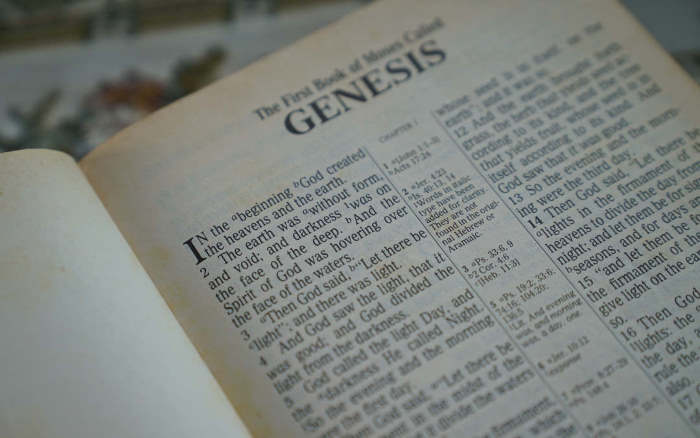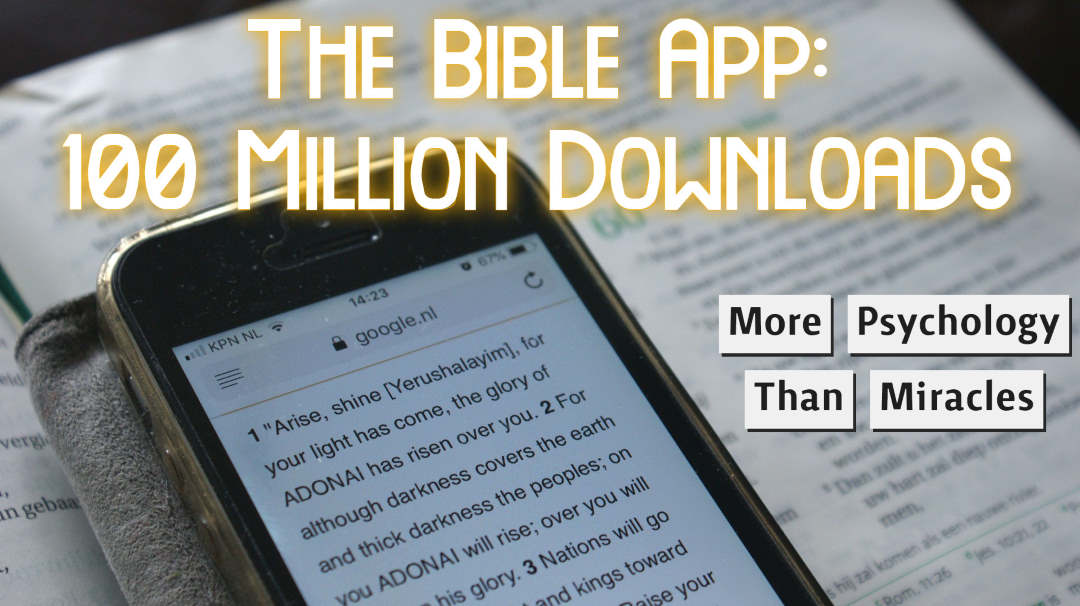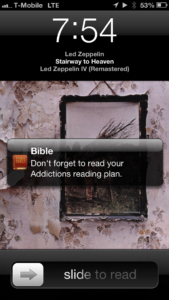It’s not often an app has the power to keep someone out of a strip club. But according to Bobby Gruenewald, CEO of YouVersion, that’s exactly what his Bible app did. Gruenewald says a user of his app walked into a business of ill repute when suddenly, out of the heavens, he received a notification on his phone. “God’s trying to tell me something!,” Gruenewald recalled the user saying, “I just walked into a strip club — and man — the Bible just texted me!”
YouVersion recently announced its Bible app hit a monumental milestone — placing it among a rare strata of technology companies. The app, simply called “Bible,” is now on more than 100 million devices and growing. Gruenewald says a new install occurs every 1.3 seconds.
On average, some 66,000 people have the Bible app open during any given second, but that number climbs much higher at times. Every Sunday, Gruenewald says, preachers around the world tell devotees, “to take out your Bibles or YouVersion app. And, we see a huge spike.”
The Bible app was funded and built by LifeChurch.tv of Edmond, Oklahoma. Though Silicon Valley digerati rarely heed lessons from churches in red states, in this case, Gruenewald and his team have something to preach about.
The market for religious apps is fiercely competitive; searching for “bible” in the Apple App Store returns 5,185 results. But among all the choices, YouVersion’s Bible app seems to be the chosen one, ranking at the top of the list and boasting over 641,000 reviews.
How did YouVersion come to dominate the digital word of God? It turns out there is much more behind the Bible app’s success than missionary zeal. The company is a case study in how technology can change behavior when it utilizes the principles of consumer psychology coupled with the latest in big data analytics.
According to industry insiders, the YouVersion Bible could be worth a bundle. Jules Maltz, General Partner at Institutional Venture Partners, told me, “As a rule of thumb, a company this size could be worth $200 million and up.”
Maltz should know. His firm recently announced an investment in another pre-revenue app, Snapchat, at an $800 million valuation. Maltz justifies the price by pointing to the per user valuations of other tech companies like Facebook, Instagram, and Twitter, who each commanded astronomical sums well before turning a profit. Maltz was quick to add, “Of course, this assumes the company can monetize through standard advertising.”
Placing ads in the Bible app would rain manna from heaven and the church which originally funded the Bible app would suddenly become, shall we say, very blessed. However, Gruenewald says he has no intention of ever turning a profit from the Bible app.
Despite multiple buyout offers and monetization opportunities, the Bible app remains strictly a money-losing venture. Lifechurch.tv has invested over $20 million in the Bible app but, according to Gruenewald, “The goal is to reach and engage as many people as possible with scripture. That’s all.” So far, Gruenewald is meeting his goal.

In the Beginning
Gruenewald is a quick-thinking, fast-talking man. During our conversation, he pulled up statistics in real-time, stopping himself mid-sentence whenever relevant data flashes on his screen and grabs his attention. As Gruenewald preaches on about mobile app development best-practices, I need to occasionally interrupt him to ask clarifying questions. My words stumble over his enthusiasm as he bears witness to what he’s learned building his Bible app. He spouts user retention figures with the same gusto I’d imagine he might proclaim scripture.
“Unlike other companies when we started, we were not building a Bible reader for seminary students. YouVersion was designed to be used by everyone, every day.” Gruenewald attributes much of the Bible app’s success to a relentless focus on creating habitual Bible readers.
Gruenewald is well-prepared for our interview and, thanks to an email his publicist sent me prior to our call, so am I. In the email, the Bible app’s success is broken down into the language of habit formation more commonly seen in psychology textbooks. The “cues”, “behaviors” and “rewards” of communing with the Lord are bullet-pointed and ready for our discussion.
“Bible study guides are nothing new,” Gruenewald says. “People have been using them with pen and paper long before we came along.” But as I soon find-out, the Bible app is much more than a mobile study guide.
In fact, the first version of YouVersion was not mobile at all. “We originally started as a desktop website, but that really didn’t engage people in the Bible. It wasn’t until we tried a mobile version that we noticed a difference in people, including ourselves, turning to the Bible more because it was on a device they always had with them.”
Indeed, people started taking the Bible with them everywhere. Recently, the company revealed users read scripture in the most unsanctified places — 18% of readers report using the Bible app in the bathroom. While the 100 million install mark is an impressive milestone, perhaps the more startling fact is that users can’t put the Bible app down long enough to take a holy shit.

How to Form a God Habit
Gruenewald acknowledges the Bible app enjoyed the good fortune of being among the first of its kind at the genesis of the App Store in 2008. To take part, Gruenewald quickly converted his web site into a mobile app optimized for reading. His Bible app caught the rising tide, but soon a wave of competition followed. If his Bible app was to reign supreme, Gruenewald needed to get users hooked quickly.
That’s when Gruenewald says he implemented a plan — actually, many plans. A signature of the Bible app is its selection of over 400 reading plans — a devotional iTunes of sorts, catering to an audience with diverse tastes, troubles and tongues.
Given my personal interest and research into habit-forming technology, I decided to start a Bible reading plan of my own. I searched the available themes for an area of my life I needed help with. A plan titled, “Addictions,” seemed appropriate.
Reading plans provide structure to the difficult task of reading the Bible for those who have yet to form the routine. “Certain sections of the Bible can be difficult for people to get through,” Gruenewald admits. “By offering reading plans with different small sections of the Bible each day, it helps keep [readers] from giving up.”
The Bible app chunks and sequences the text by separating it into bite-size pieces. By parsing readings into communion wafer-sized portions, the Bible app focuses the reader’s brain on the small task at hand, while avoiding the intimidation of reading the entire book.

Holy Triggers
5 years of testing and tinkering have helped Gruenewald’s team discover what works best. Today, the Bible app’s reading plans are tuned to immaculate perfection and Gruenewald has learned that frequency-of-use is paramount. “We’ve always focused on daily reading. Our entire structure for plans focuses on daily engagement.”
To get users to open the Bible app every day, Gruenewald makes sure he sends effective cues — like the notification sent to the sinner in the strip club. But Gruenewald admits he stumbled upon the power of using good triggers. “At first we were very worried about sending people notifications. We didn’t want to bother them too much.”
To test how much of a cross users were willing to bear, Gruenewald decided to run an experiment. “For Christmas, we sent people a message from the app. Just a ‘Merry Christmas’ in various languages.” The team was prepared to hear from disgruntled users annoyed by the message. “We were afraid people would uninstall the app,” Gruenewald says. “But just the opposite happened. People took pictures of the notification on their phones and started sharing them on Instagram, Twitter, and Facebook. They felt God was reaching out to them.” Today, Gruenewald says, triggers play an important role in every reading plan.
On my own plan, I receive a daily notification on my phone, which reads, “Don’t forget to read your Addictions reading plan.” Ironically, the “addiction” I’m trying to cure is my dependency on digital gadgetry, but what the hell, I’ll fall off the wagon just this once.
In case I somehow avoid the first message, a red badge over a tiny Holy Bible icon cues me again. If I forget to start the first day of the plan, I’d receive a message suggesting perhaps I should try a different, less challenging plan. I also have the option of receiving verse through email and if I slip-up and miss a few days, another email would serve as a reminder.
The Bible app also comes with a virtual congregation of sorts. Members of the site tend to send encouraging words to one another, delivering even more triggers. According to the company’s publicist, “Community emails can serve as a nudge to open the app.” Triggers are everywhere in the Bible app and Gruenewald says they are a key part of the Bible apps’ ability to keep users engaged.
To some, all these messages might become a nuisance. But remember, this is the Bible, and uninstalling the Bible app or turning off notifications would basically be flipping the Lord the bird.

Glory Be in the Data
Gruenewald’s team has sifted through behavioral data collected from millions of readers to better understand what users want from the Bible app. “We just have so much data flowing through our system,” Gruenewald said. “We were generating so much of it that apparently we showed up on Google’s radar and they contacted us to take a closer look.” Gruenewald reports his company recently completed work with Google engineers to help, “with storing and analyzing data so they could solve [these problems] for others as well.”
The data revealed some important insights on what drives user retention. High on Gruenewald’s list of learnings was the importance of “ease of use,” which came-up throughout our conversation.
In-line with the work of psychologists dating back to Gestalt psychologist Kurt Lewin, to modern-day researchers like BJ Fogg, the Bible app uses the principle that by making an intended behavior easier to do, people do it more often.
The Bible app is designed to make absorbing the Word as frictionless as possible. For example, to make the Bible app habit easier to adopt, a user who prefers to not read at all, he can simply tap a small icon, which plays a professionally produced audio track, read with all the dramatic bravado of Charlton Heston himself.
Gruenewald says his data also revealed that changing the order of the Bible, placing the more interesting sections up-front and saving the boring bits for later, increased completion rates. Furthermore, daily reading plans are kept to a simple inspirational thought and a few short verses for newcomers. The idea is to get neophytes into the ritual for a few minutes each day until the routine becomes a facet of their everyday lives.

Rewards from the Lord
Gruenewald says the personal connection people have with scripture taps into deep emotions that, “we need to use responsibly.” Readers who form a habit of using the Bible app turn to it not only when they see a notification on their phone, but also whenever they feel low and need a way to lift their spirits.
“We believe that the Bible is a way God speaks to us,” Gruenewald says. “When people see a verse, they see wisdom or truth they can apply to their lives or a situation they’re going through,” Skeptics might call this subjective validation, psychologists could call it the Forer effect, but to the faithful, it amounts to personally communicating with God.
Upon opening the Bible app, I find a specially selected verse waiting for me on the topic of “Addictions”. With just two taps I’m reading 1 Thessalonians 5:11 – encouragement for the “children of the day,” imploring them with the words, “let us be sober.” It’s easy to see how these comforting words could serve as a sort of prize wrapped inside the Bible app, helping readers feel better and lifting their mood.
Gruenewald says there is also an element of mystery and variability associated with using the Bible app. “One woman would stay-up until just past midnight to know what verse she had received for her next day,” Gruenewald says. The unknown, which verse will be chosen for the reader and how it relates to their personal struggle, becomes an important driver of the reading habit.
As for my own reward, after finishing my verse, I received confirmation from a satisfying ”Day Complete!” screen. A check mark appeared near the scripture I had read and another one was placed on my reading plan calendar. Skipping a day would mean breaking the chain of checked days, employing what psychologists call the “endowed progress effect” — a tactic also used by video game designers to encourage progression.

Sharing the Word
As habit-forming as the Bible app’s reading plans can be, they are not for everyone. In fact, Gruenewald reports most users never register for an account with YouVersion. Millions choose to not follow any plan, opting instead to use the app as a substitute for their paper Bibles.
But to Gruenewald, using the Bible app in this way suits him fine. Just because a reader never registers, does not mean Gruenewald has not found a way to help them grow the Bible app. In fact, social media is abuzz with the 200,000 pieces of content shared from the app every 24 hours.
To help the Bible app spread, a new verse greets the reader on the first page. Below it, a large blue button reads, “Share Verse of the Day,” whereby clicking the button blasts scripture to Facebook or Twitter.
Just why people share scripture they’ve just read is not widely studied. However, one reason may be the reward of portraying oneself in a positive light, also known as the humblebrag. A recent Harvard meta-analysis titled, “Disclosing information about the self is intrinsically rewarding” found the act, “engages neural and cognitive mechanisms associated with reward.” In fact, sharing feels so good that one study found, “individuals were willing to forgo money to disclose about the self.”
There are many opportunities to share verse from within the Bible app, but one of Gruenewald’s most effective distributions channels occurs not online but in-row — that is, in the pews church-goers sit-in every week.
“People tell each other about the app because they use it surrounded by people who ask about it.” Gruenewald says the Bible app always sees a spike in new downloads on Sundays when people are most likely to share it through word of mouth.
However, nothing consummates the reign of Gruenewald’s Bible app quite like the way preachers in some congregations have come to depend upon it. YouVersion lets religious leaders input their sermons into the Bible app to allow their assemblies to follow along in real-time — book, verse, and passage — all without flipping a page. Once the head of the church is hooked, the flock is sure to follow.

For All Eternity
But using the Bible app at church not only has the benefit of driving growth, it builds commitment. Every time users highlight a verse, add a comment, bookmark, or share from the Bible app, they invest in it.
Behavioral economists Dan Ariely and Michael Norton have shown the effect small amounts of work have on the way people value various products. Known as the “IKEA effect,” studies have shown that things we put labor into, become worth more to us.
It is reasonable to think that the more readers put into the Bible app in the form of small investments, the more it becomes a repository of their history of worship. Like a worn dog-eared book, full of scribbled insights and wisdom, the Bible app becomes a treasured asset not easily discarded.
The more readers use the Bible app, the more valuable it becomes to them. Switching to a different digital Bible — God forbid — becomes less likely with each new revelation a user types into the Bible app, further securing YouVersion’s dominion.
Gruenewald claims he is not in competition with anyone, but he does on occasion rattle off the App Store categories where he holds a high ranking. His place at the top of the charts appears secure now that the Bible has crossed its 100 millionth install.
But Gruenewald plans to continue sifting through the terabytes of data to search for new ways to increase the reach of his Bible app and make the Bible even more habit-forming. To its tens of millions of regular users, Gruenewald’s Bible app is a Godsend.
***
Thank you to Max Ogles, Ryan Hoover, Kevin Madsen, and Casey Bankord for reading early versions of this essay.
Copyright 2013, Nir Eyal, as first published in TheAtlantic.com
Related Articles
- Schedule Maker: a Google Sheet to Plan Your Week
- Cancel the New York Times? Good Luck Battling “Dark Patterns”
- How to Start a Career in Behavioral Design
- A Free Course on User Behavior
- User Investment: Make Your Users Do the Work
- Variable Rewards: Want To Hook Users? Drive Them Crazy
- The Hooked Model: How to Manufacture Desire in 4 Steps


